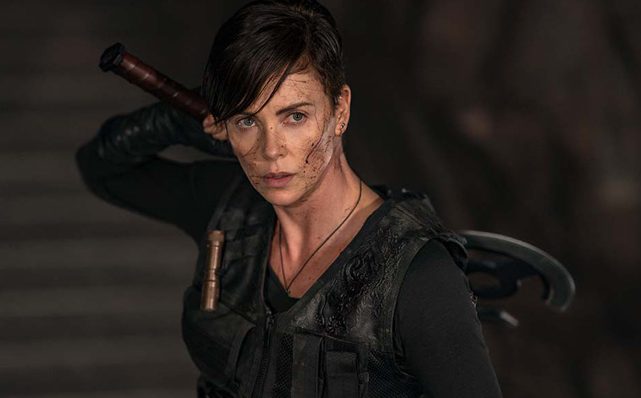The Old Guard is Netflix’s most recent foray into the comic book superhero adaptation arena, an area it’s pulled from a number of times over the years, mostly in the form of TV shows like Jessica Jones, Daredevil, Luke Cage. An interesting pattern in these shows is that they tend to run like a long-form movie, often lacking episode-specific structure in favor of the binge-model assumption that you’ll gobble up the episodes quite quickly.
So I was surprised to find that The Old Guard, a Netflix film adaptation of the comic by the same name from Greg Rucka (who also penned the film’s script) and Leandro Fernandez, felt like the opposite: like a longer-form TV show condensed into the confines of a movie.
The Old Guard stars Charlize Theron as the leader of an immortal group of mercenaries. Though they aren’t 100% immortal, which I guess technically means they aren’t immortal at all – their immortality can randomly dry up at any time, and one of them has died in the past. Still they’ve lived for hundreds of years uninterrupted by disease, injuries, or death. For the first time in 200 years, though, they sense the presence of a new immortal, Nile (Kiki Layne), a U.S. marine killed in duty only to be immediately resurrected by her innate powers. While they search for Nile, they’re also being hunted down by scientists and entrepreneurs (Chiwetel Ejiofor and Harry Melling), who want to harness their immortality for the better of humanity (or the potential profits it will result in).
As you might guess by my feels-like-a-TV-show comment, The Old Guard is an incredibly interesting concept with a solid core of actors behind it, but it suffers from serious script and pacing issues. For the first 30 minutes or so I was hooked on the world building and lore surrounding this group of immortals. Director Gina Prince-Bythewood clearly has a good command of the film in its quieter and more character-based or introspective moments, and she’s particularly good at seamlessly infusing the old-world feeling lore with a more modern aesthetic, with our heroes often casually alternating between ornate axes and automatic handguns.
In addition to Layne and Theron’s stellar-as-usual performances, I was also particularly fond of new-to-me actors Marwan Kenzari and Luca Marinelli, two members of the immortal group who’ve been in the longest of long-term relationships. Unfortunately, the script only scratches the surface of the interesting dynamic of a hundreds-of-years-old partnership.
After that first 30 minutes, The Old Guard start to lose steam quickly. The character development fades to the background in favor of short bursts of repetitive beats: fighting, running, rinse, repeat. Because of that pacing I felt every minute of the film’s 2 hours (not particularly long, even, by today’s standards) once we’d moved past the opening 30 minutes. This is a shame, because the film really garnered my interest in the source material. But my interest in who these people are and where they’ve been up to this point was largely lost as the film went on and focused on more straight forward action/espionage story beats, most of which felt fairly contrived or unconvincing. The mustache twirling villain and his motivations, in particular, fell flat – money! Power! And so on!
The Old Guard had a lot of potential to be something special as a longer-form, character-based form of storytelling, with an intriguing core concept and stellar cast. But it feels like its most interesting components are just set dressing for the more rote motions of a standalone action flick, of which the pace and storytelling is less than satisfying.
The Old Guard debuts on Netflix July 10.









Isn’t everything on Netflix a TV show masquerading as a movie (with a few exceptions, like The Irishman)?
The worst part to me was finding the movie getting a bit more interesting toward the end, the team is built, they have their ‘Charlie’ to call the shots at HQ and give them missions, annnnnnd that’s where it ends. It felt like one big long teaser trailer or pilot for a tv series.
Comments are closed.